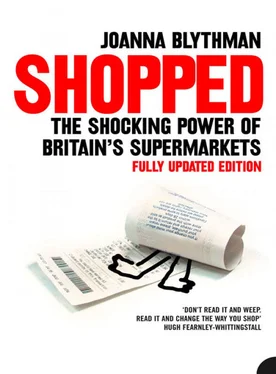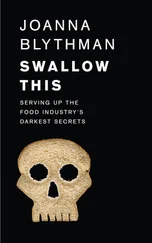In no time at all it was as if a horrible black burden had been lifted off my shoulders. The day-in, day-out struggle to feed everyone seemed to abate. My urge to cook and my gastronomic creativity soared. The contents of my rubbish bin shrank as it no longer had to accommodate excessive quantities of unnecessary and unsustainable supermarket packaging. An unforeseen bonus was that far from spending more money, I was spending less. This was chiefly because the independents’ prices were lower: supermarkets are surprisingly expensive places to shop for fresh, unprocessed meat, fish, fruit and vegetables. But it was also because I wasn’t routinely over-buying and being snared into stocking up with products I did not need and probably would never get around to eating. In fact, we were spending less money on food but eating better and more healthily than before.
Then I got the idea of writing a book about supermarkets. I wanted to investigate why they were so incapable of supplying the kind of food that I, and a growing number of people, want to eat. I began to see how we consumers had unwittingly relinquished sovereignty over what we eat to a handful of large corporations that now control 80 per cent of the UK’s shopping spend.
In effect, our shopping choices are now dictated by a few monopolistic retailers who, by wooing consumers with apparently low prices and lobbying subsequent governments not to interfere with their divine right to make money, have been allowed to develop an unhealthy grip over the nation’s shopping basket. At the beginning of 2007, Tesco ate up almost 32 per cent of the UK’s spend, giving it a scary degree of purchasing power over suppliers and considerable scope to redesign what we eat to suit its own objectives.
Let’s be clear that large supermarket chains are companies whose aim is not, first and foremost, to meet society’s interests. They aren’t too concerned about being excellent grocers, or supplying the nation with good-quality, wholesome food, or supporting British farmers or treating Third World workers ethically or being kind to turkeys or helping working mothers to feed their children better – or any other goal of which many of us would approve. The leading supermarket chains are all making great play of how ‘green’ they are. Tesco says that it is going to publish the carbon footprint of each of its products while Sainsbury’s, Asda and Waitrose have all pledged to reduce waste, amongst other measures. Some supermarket green claims sound better than they really are. Tesco has introduced degradable bags, but they are still made from plastic. These ‘degradable’ bags need sunlight in order to break down, and the majority will probably end up in landfill sites where they are more likely to break down into methane, a potent greenhouse gas.
UK supermarkets are definitely making efforts to green up their act, but when the National Consumer Council examined their performance in 2006 – looking at food transport, waste, sustainable sourcing and farming – it concluded that no supermarket rated well on all criteria. The truth is that supermarkets find it extremely difficult to ‘go green’ because environmental damage is part of the fabric of their business, thanks to transport-related carbon emissions, excessive packaging and their endless expansion plans. So they are happy to go along with ideas or demands that are generally progressive, such as stocking more organic food or installing solar panels, but only as long as it is in their commercial interest to do so. The crunch comes when doing the right thing – the ethical thing – would actually cost them money or interfere with their modus operandi. Then they are not so keen. The bottom line is that they are stock market-driven corporations whose overarching goal is to keep their shareholders happy. And the sad fact is that, in partnership with the food industry, they have debased our whole appreciation of food. It is no coincidence that the UK, the country with the worst food culture in Europe, the one with the most palpable obesity problem, is also the country most wedded to supermarket shopping.
When you read this book I hope you too will come to see that ‘Big Food’ and ‘Big Retail’ are really two sides of the same coin. Big global food manufacturers need big supermarket chains to get their products on to the shelves and our big supermarkets need big food processors to churn out items such as chicken kievs glued together with additives to make their profits. It’s an unholy alliance where supermarkets are effectively gatekeepers for a system of food production that is about putting profit before quality, the environment or public health.
Next time you are in a supermarket, take a look at what products are on prominent special offer on those lucrative shelf ends. You can bet your bottom dollar that the vast majority will be stacked high with everything the nation would be better off not eating. The business logic, of course, is faultless. Supermarkets make more money out of selling value-added processed junk than they do good food. There’s a limit to how much they can charge for a potato, even well-scrubbed ‘heirloom’ varieties. But process a nondescript white spud into a pre-cooked, microwavable baked potato or ‘child-friendly’ potato shapes and the sky is the limit.
While consumers think that the supermarkets are there to serve us, they actually operate to a totally different agenda. Supermarkets sell us what it suits them to sell. They decide what makes them money and then they figure out ways of marketing it to us so that we want to buy it. Their stocks-in-trade are products sourced nationally or globally at their behest from an increasingly small number of large, but nevertheless captive, suppliers. In that process they are reshaping our food chain for the worse. The buying terms and prices that they impose on farmers reward and encourage intensive farming and militate against smaller, more quality-conscious producers. The supermarket system does not reward flavour or biodiversity, just volume and standardisation. You will doubtless have heard murmurings about how supermarkets treat their suppliers. Let me tell you that it is even worse than you might suspect. Nowadays supermarkets and suppliers have a feudal relationship with each other: they are lord and vassal.
The irony of the great supermarket revolution is that the concept they sold us, choice, has actually become a vehicle for denying us that. What ‘choice’ do we really have when all we have to choose between is a Tesco or an Asda, a Sainsbury’s or a Morrisons? You may have noticed, at least at a subliminal level, how one chain’s sandwich is pretty much like another’s, how supermarket chicken tikkas all share that haunting industrial gloopiness. Large supermarkets typically stock some 32,000 lines, but a bit like a subscription to endless American or Italian TV channels, it’s a quantitative, not qualitative choice. And this supermarket monotony becomes all the more oppressive as the supermarkets recolonise with smaller-format stores the high streets they killed off in the first place.
But as more centres turn into anonymous, identikit trolley towns dominated by the suffocating presence of big supermarket chains, we consumers do have a choice. We can lie down and let the supermarkets take total control of what ends up on our plates. We can stand by, dismayed but passive, as they drive all but the largest farmers and food suppliers out of business by sourcing products from parts of the globe where they can buy for even less. Or we can change our food shopping habits and use them to vote for a different sort of food economy, one that supports small, local and diverse, not large, global and monotonous. I hope that when you read this book, you’ll ask yourself which sort of food world you want to live in. We can’t have both.
Читать дальше












